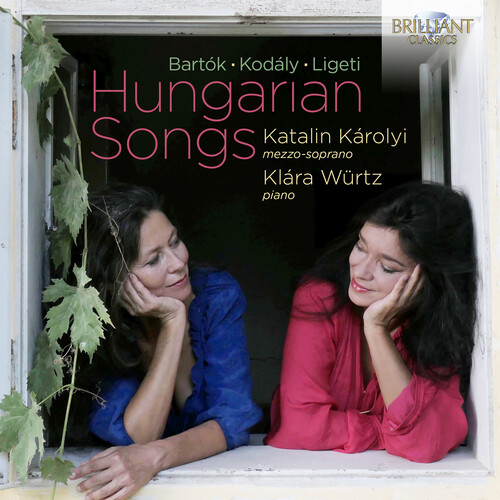Show results for
Deals
- 4K Ultra HD Sale
- 50s Films Sale
- Action Sale
- Alternative Rock Sale
- Anime sale
- Award Winners Sale
- Bear Family Sale
- Blu ray Sale
- Blues on Sale
- British Sale
- Christmas in July
- Classical Music Sale
- Comedy Music Sale
- Comedy Sale
- Country Sale
- Criterion Sale
- Drama Sale
- Electronic Music sale
- Folk Music Sale
- Horror Sci fi Sale
- Kids and Family Sale
- Metal Sale
- Music Video Sale
- Musicals on Sale
- Mystery Sale
- Naxos Label Sale
- Page to Screen Sale
- Paramount Sale
- Rap and Hip Hop Sale
- Reggae Sale
- Rock
- Rock and Pop Sale
- Rock Legends
- Soul Music Sale
- TV Sale
- Vinyl on Sale
- War Films and Westerns on Sale

Hungarian Songs
- Format: CD
- Release Date: 7/28/2023

Hungarian Songs
- Format: CD
- Release Date: 7/28/2023
- Composers: Bela Bartok, Gyorgy Ligeti, Zoltan Kodaly
- Label: Brilliant Classics
- UPC: 5028421969268
- Item #: 2633489X
- Genre: Classical
- Release Date: 7/28/2023

Product Notes
Only one year and a half after their first meeting in Budapest in early 1905, Bartók and Kodály were eager to jointly publish their first settings of Hungarian folk songs. In their foreword to the volume Magyar népdalok (Hungarian Folk Songs), they declare their goal thus: "... to get the general public to know and appreciate folk songs." The Ten Hungarian Folk Songs from 1906 (BB 43), Bartók's earliest and still quite rudimentary but imaginative and very sensitive folk-song arrangements, were collected by the 25-year-old himself mostly in three regions of the Hungarian countryside: near Budapest, Békéscsaba, and the lake Balaton. This set, from which we can listen to four arrangements on this CD, has never been offered by Bartók to be published. Having collected peasant music from regions of the Hungarian Kingdom where significant Romanian and Slovak minorities lived, Bartók immediately became intrigued by the peculiarities - and from his point of view, musical freshness - of both nations' songs and instrumental dances. His reverence for the folklore of the Slovaks can be felt in the five arrangements of the Falún (Village Scenes) series (BB 87a), composed in 1924 and based on folk songs from the Zólyom (in Slovakian: Zvolenská) region of what was then Upper Hungary (now Slovakia) he collected in 1917 from village women. These arrangements of bursting energy, enchantingly deep emotionality and transcendence also bear testimony to Bartók's discovery of Stravinsky's music which he was galvanised by in the early 1920s. The texts are sung by Katalin Károlyi in Hungarian here, not in their original Slovak-language version. Before leaving Hungary for Austria and West Germany after the fall of the 1956 revolution, György Ligeti (1923-2006) not only collected folk music in his native Transylvania but also worked for the Institute for Folklore in Bucharest and Kolozsvár in the late 1940s. Thus, in his twenties and thirties, he followed the footsteps of his idols, Bartók and Kodály. In the last months of 1952, Ligeti set to music five poems by János Arany, a leading figure of 19th-century Hungarian poetry. Both text and music are deeply rooted in Hungarian folk songs; indeed, most of Ligeti's melodies, or parts thereof, could be actual folk songs, just like Arany's texts from almost a century earlier could be folk-song texts. The last piece is an exception, being a daring musical setting of Arany's 1868 Hungarian translation of Robert Burns' humorous song The Deil's Awa Wi' Th' Exciseman (1792).

